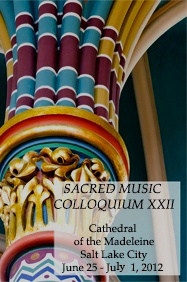At OLPH (practice on Mondays at 7:30)
Saturday Mass (8:15AM) (Warm - up starts at 7:40)
Oct. 2, 16, 30
Kyrie XVII
Gospel Accl.
Sanctus XVIII
Mysterium Fidei and Amen
Agnus Dei XVIII
Anima Christi (Oct.2)
Ubi caritas (Oct. 16)
Adoro te (Oct.30 )
Salve Regina
At Resurrection Church (practice on Tuesdays at 7:30 PM)
Satruday Mass (9AM) (Warm-up starts at 8:30)
Oct. 9,23
Kyrie XVII
Gospel Accl.
Sanctus XVIII
Mysterium Fidei and Amen
Agnus Dei XVIII
Anima Christi (Oct.9)
Adoro te (Oct. 23)
Salve Regina
At St. Martin's (Little Sisters of the Poor)
Twenty-nineth Sunday in Ordinary time
Oct. 17, Sunday, 10:30 (warm-up at 10AM)
Introit (Entrance antiphone) : schola
I call upon you God, for you will answer me; bend your ear and hear my prayer.
Guard me as the pupil of your eye; hide me in the shade of your wings
Entrance Hymn: In His Temple (213)
Kyrie (857)
Gloria (858)
Responsorial Psalm:
Our help is from the Lord, who made heaven and earth.
Gospel Acclamation
Offertory Proper: schola
Sanctus (859)
Mysterium Fidei (priest)
(all)
Mortem tuam annuntiamus Domine,
et tuam resurrectionem confitemur, donec venias
(We proclaim Thy death, O Lord,
and we confess Thy resurrection, until Thou comest.)
Doxology: Amen
Agnus Dei (862)
Communion Proper (schola)
See how the eyes of the Lord are on those who fear him, on those who hope in his love that he may rescue them from death and feed them in time of famine.
Communion Hymn: Be Thou My Vision
Recessional Hymn: Salve Regina (708)
Children's Schola
(classes at St. Paul on Monday & at St. Michael's Academy on Thursday)
First Friday Mass, Oct.1
OLPH 8:15 AM (warm up starts at 7:45 AM)
Ave Maria(prelude)
Kyrie XVI
Gospel Accl.
Veni Creator
Sanctus XVIII
Mysterium Fidei and Amen
Agnus Dei XVIII
Adoro te devote
Thursday, September 30, 2010
Thursday, September 16, 2010
A Church Musician's Lament By Michael Olbash
http://www.magisterium.net/lament.htm
The hymns of the St. Louis Jesuits, however hideously they might be crafted as pieces of music, at least are usually based upon Scripture and authentic Catholic teaching. But other songs from the 1980s and 1990s--by composers like David Haas, Michael Joncas, and Marty Haugen--are more frightening. Not only is the music poorly crafted; not only are the words trite; not only are the melodies shamelessly dramatic and emotional; but many of these contemporary composers proudly identify themselves as theological liberals, and the teachings that they subtly espouse through their music can be dangerous.
Personally, I stopped performing the music of David Haas after he published Dear Sister God, and presented a music workshop at which he and his ex-wife, composer Jeanne Cotter, informed the participants of their "duty" and "responsibility" to purge their parishes of "exclusive language" in the liturgy.
Father Jan Michael Joncas, the notorious composer of the drippingly saccharine "On Eagle's Wings," is another serious offender, who promotes misleading ideas about Holy Communion. His series of songs and rituals called "Tableprayer" is used all round the country by women and non-Catholics who act as quasi-celebrants, breaking bread and sharing wine at meetings that tread dangerously close to profaning the Catholic Mass.
Marty Haugen, a Lutheran whose music is probably performed more widely in American Catholic parishes than that of any other composer, has produced ugly, ridiculous hymns that emphasize the sun, the moon, trees, and dancing--all set to primitive melodies that evoke a whimsical stroll through a field of organic sunflowers.
Crack open a copy of GIA Publication's Gather hymnal or the annual Music Issue from Oregon Catholic Press, and you will find clear evidence of feminist theology, an overwhelming amount of confusing (if not outright heretical) texts about the nature of the Eucharist, and countless awkward "inclusive language" revisions of familiar hymns. You will find dozens of songs and "psalm settings" that are said to be "based on" or "inspired by" passages from Scripture, yet completely obliterate the meaning of the original text.
The hymns of the St. Louis Jesuits, however hideously they might be crafted as pieces of music, at least are usually based upon Scripture and authentic Catholic teaching. But other songs from the 1980s and 1990s--by composers like David Haas, Michael Joncas, and Marty Haugen--are more frightening. Not only is the music poorly crafted; not only are the words trite; not only are the melodies shamelessly dramatic and emotional; but many of these contemporary composers proudly identify themselves as theological liberals, and the teachings that they subtly espouse through their music can be dangerous.
Personally, I stopped performing the music of David Haas after he published Dear Sister God, and presented a music workshop at which he and his ex-wife, composer Jeanne Cotter, informed the participants of their "duty" and "responsibility" to purge their parishes of "exclusive language" in the liturgy.
Father Jan Michael Joncas, the notorious composer of the drippingly saccharine "On Eagle's Wings," is another serious offender, who promotes misleading ideas about Holy Communion. His series of songs and rituals called "Tableprayer" is used all round the country by women and non-Catholics who act as quasi-celebrants, breaking bread and sharing wine at meetings that tread dangerously close to profaning the Catholic Mass.
Marty Haugen, a Lutheran whose music is probably performed more widely in American Catholic parishes than that of any other composer, has produced ugly, ridiculous hymns that emphasize the sun, the moon, trees, and dancing--all set to primitive melodies that evoke a whimsical stroll through a field of organic sunflowers.
Crack open a copy of GIA Publication's Gather hymnal or the annual Music Issue from Oregon Catholic Press, and you will find clear evidence of feminist theology, an overwhelming amount of confusing (if not outright heretical) texts about the nature of the Eucharist, and countless awkward "inclusive language" revisions of familiar hymns. You will find dozens of songs and "psalm settings" that are said to be "based on" or "inspired by" passages from Scripture, yet completely obliterate the meaning of the original text.
Subscribe to:
Comments (Atom)
